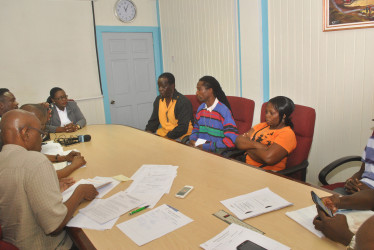Glendon Critchlow Jr., his spouse Natasha Daniels and their son Tyrique are among the many victims of a gold-mining industry that can be as cruel as it can be charitable.
Had all been well, the 37-year-old excavator operator would have been plying his trade at a Port Kaituma mining location to support his family and meet the expenses associated with managing his 11-year-old son’s medical condition. Instead, Glendon sits at his Friendship, East Coast Demerara home, waiting, he says, to be paid amounts totaling $2.3 million owing to him over several months by an employer who he says, has been oblivious to his appeals. All this time he has had to endure a wife who appears permanently unhappy and close to tears and a son who bears a resemblance of a troubled child. At intervals, the family makes sorties into the city to be updated on the status of their payments.

It is the same with Noel Sanbatch, a 47-year-old bulldozer operator and mechanic. He is owed $1.7 million in wages by the same employer. At Corentyne, where he lives, his debt to the shopkeeper who has kept his family supplied with food during his stay in the interior has reached $300,000. Not surprisingly, credit has dried up. When all the other options had been exhausted and for the time being at least, Sanbatch’s two sons, aged 14 and 15, had to set aside school to work to support the family. The older of the two boys has had to put his CXC examinations on hold. One of Sanbatch’s two young daughters is stricken by a malady that makes her unable to walk.
Neither Glendon nor Noel is oblivious to the
difficulties associated with leaving a vulnerable family behind to seek a living in the goldfields. Taken in isolation from everything else the salary levels can seem attractive. Once you are at the camp site, however, you can easily be at the mercy of an employer whose sole preoccupation is with mining gold and raking in vast profits. That has been their story.
First at the Ministry of Social Protection and, these days, at the Ministry of Natural Resources both men have resorted to the ‘clinics’ held by Junior Minister Simona Broomes. She has had results with other similar cases and they are hopeful. Still, Glendon says, “every day is a new struggle.” Reluctantly, he discloses the details of his family’s customary diet. Those we have chosen to keep to ourselves.
Their employer’s liabilities aside, the two men have found themselves marooned at the mining site with little food and no money with which to travel. It is a condition which, Minister Broomes says, amounts to denying the men their liberty.
Natasha talks, albeit reluctantly, about the fact that the family has had to fall back on her older son and daughter to ‘help out.’ She does so, hesitantly and in hushed tones, almost tongue-tied at intervals with embarrassment.
Noel says that what upsets him most is his former employer’s excursions into arrogance, bragging as he does of friends in high places and immunity from sanction.
If neither family appears to doubt the earnestness of the woman who now serves as Junior Minister in the Minister of Natural Resources they point out that at times like these the wheel of justice is inclined to turn slowly. While they acknowledge that times have changed from the era when there was simply no recourse in circumstances like theirs, their dire situations have spawned an understandable impatience with bureaucracy. Their former employer, meanwhile, has sought recourse in legal counsel though, to what end, is unclear.
The plight of Critchlow and Sanbatch is as much a headache for their families as it is a challenge for the Government of Guyana. High urban unemployment has made the gold mining sector the single most popular option for Guyanese men and, increasingly, women; and yet the story of these two families provides a harsh reminder of the saying that all that glitters is not gold.







